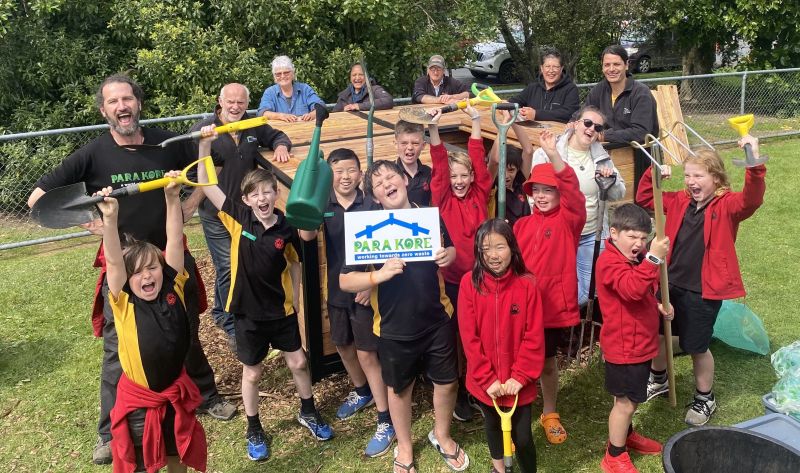
Image supplied by Para Kore Marae Ltd
<h2>Circular waste management can empower communities.</h2>
<p>“It is hands on, practical learning with real life, tangible outcomes,” said Paul Murray of <a href="https://www.parakore.maori.nz/" target="_blank" rel="noopener">Para Kore Marae Ltd</a>.</p>
<p>Para Kore Marae is a national Māori zero waste organisation. Recently, it collaborated with <a href="https://www.tkp.school.nz/" target="_blank" rel="noopener">Te Kauwhata Primary School</a> and <a href="https://carboncyclecompost.com/" target="_blank" rel="noopener">The CarbonCycle Company</a>. Together, using funding allocated by the Waikato District Council, the project established a community compost hub in the school, servicing their small town of just under 3000 residents.</p>
<p><strong><a href="https://www.schoolnews.co.nz/latest-print-issue/" target="_blank" rel="noopener">Read the latest print edition of <em>School News</em> HERE</a></strong></p>
<p>Murray said that tamariki at Te Kauwhata Primary were involved at each stage of the project – not a single learning opportunity was wasted. Building the compost structure and putting the first scraps into the hub were all used as opportunities for learning about subjects like microbiology and soil composition. At the first turning of the compost weeks later, children learned about the soil food web and healthy soil indicators.</p>
<p>The compost project also creates opportunities for ākonga to learn about Mātauranga Māori, and the project has been tied into the new local histories curriculum. The hub highlights how we are intrinsically connected to the whenua. “Composting is another way of being a good ancestor,” said Murray.</p>
<figure id="attachment_30999" aria-describedby="caption-attachment-30999" style="width: 405px" class="wp-caption aligncenter"><img class=" wp-image-30999" src="https://www.schoolnews.co.nz/wp-content/uploads/2024/06/SN65-PROP-CS-CarbonCycle-Company-2.jpg" alt="Composting" width="405" height="304" /><figcaption id="caption-attachment-30999" class="wp-caption-text">Image supplied by Para Kore Marae Ltd.</figcaption></figure>
<p>The community compost hub is helmed by ex-teacher aide Rhonda Irvine, who is now the community compost hub manager. Previously, Irvine was the school gardens manager. Now, she is helping to create soil that will help feed those gardens. </p>
<p>“The Te Kauwhata Community Compost Hub model highlights the intersection of community relationships and participation, education and learning, waste-minimisation, zero waste and environmental restoration,” said Murray. </p>
<p>With the compost hub up and running, Irvine is continuing to build relationships with the local community, including contacting local businesses and running initiatives like installing a community food-waste drop-off bin. That means hopefully one day, all of the residents in Te Kauwhata can enjoy locally made soil.</p>
<p><a href="https://www.schoolnews.co.nz/2024/06/beyond-the-bin-effective-waste-management/" target="_blank" rel="noopener">Read more on effective waste management strategies in schools here.</a></p>

NZEI Te Riu Roa is considering legal action against the government for the disestablishment of…
NZQA is implementing AI-marking for all Year 10 written assessments from this year onwards, following…
Teaching personal financial responsibility isn't enough. Children should be taught broader economic context, argue New…
When students can't hear the teacher, they can't learn properly. Sound quality matters in education…
The Garden City is rich with learning opportunities, no matter what subject or part of…
Teaching Council of Aotearoa launch school leaders’ stories project with Unteach Racism to challenge institutional…
This website uses cookies.